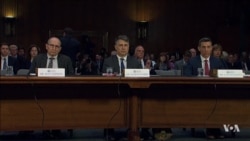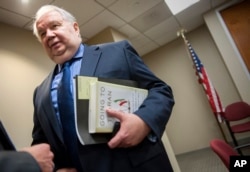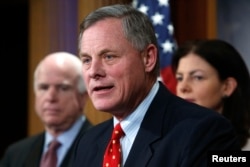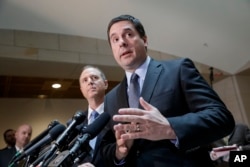U.S. President Donald Trump's former national security adviser, Michael Flynn, has offered to cooperate with congressional investigators looking into contacts between Trump campaign advisers and Russia, as long as Flynn is granted immunity from prosecution.
The Wall Street Journal first reported Thursday that Flynn is in talks to try to get a promise of immunity, but that no one had agreed to his terms.
Watch: Russian Election Meddling Tactics Exposed at Senate Hearing
"General Flynn certainly has a story to tell, and he very much wants to tell it, should the circumstances permit,'' Flynn's attorney, Robert Kelner, said in a statement issued later Thursday. "We will not comment right now on the details of discussions between counsel for General Flynn and the House and Senate Intelligence Committees, other than to confirm that those discussions have taken place."
Kelner went on to say, "No reasonable person ... would submit to questioning in such a highly politicized, witch-hunt environment without assurances against unfair prosecution."
Flynn, a retired lieutenant general, was forced to resign as one of Trump's closest advisers after it was revealed that he had misled Vice President Mike Pence about his communications with Russia's ambassador to the U.S., Sergey Kislyak.
The House and Senate intelligence committees are looking into whether any associates of Donald Trump may have coordinated with agents of the Russian government seeking to meddle in last year's presidential election.
Unprecedented meddling
Experts told the Senate Intelligence Committee on Thursday that Russia pulled off an unprecedented and wildly successful campaign to influence America's political conversation during the election campaign.
"Russia hopes to win the second Cold War through the force of politics, as opposed to the politics of force," said cybersecurity expert Clinton Watts of the Foreign Policy Research Institute. Watts detailed Russia's use of cyberattacks and an elaborate disinformation campaign to confuse U.S. voters and pit Americans against each other.
The testimony confirmed what lawmakers of both parties have been saying for months.
"Russian President Vladimir Putin ordered a deliberate campaign carefully constructed to undermine our election," said the committee's top Democrat, Senator Mark Warner of Virginia.
Ahead of the open hearing, Putin blasted accusations of Russian electoral meddling as "provocations and lies." Asked on a television program whether Moscow tried to influence the outcome of the U.S. presidential election, Putin said, "Read my lips: No."
Witnesses before the Intelligence Committee described voluminous and incontrovertible evidence to the contrary.
"We've got 10 years of observation here," said Kevin Mandia, CEO of the U.S.-based cybersecurity firm FireEye. "It absolutely stretches credulity to think they [Russian actors] were not involved."
Republican Senator Marco Rubio of Florida shared an experience from his unsuccessful presidential bid last year.
"Former members of my presidential campaign team who had access to the internal information of my presidential campaign were targeted by the IP addresses with an unknown location within Russia. [The] Effort was unsuccessful," Rubio said.
"The [Russian] activities in the United States ... do seem to be exceptional," said Georgetown University security and intelligence expert Roy Godson, adding that cyber and disinformation campaigns allow Russian hackers to "hit above their weight" on the world stage.
Watts said Russia was aided last year by U.S. media outlets' extensive reports about material hacked by Russia that appeared on outlets like WikiLeaks, as well as occasions when the Trump campaign parroted disinformation that Moscow disseminated about his opponent, Democrat Hillary Clinton. He added that Russia could one day turn its informational firepower against Trump.
Russia's action "is solely based on what they want to achieve ... whatever the Russian foreign policy objectives are," Watts said. "They will turn on President Trump, as well. They win because they play both sides."
'Following the money'
The hearing was the first of many the committee expects to hold in coming months — some open to the public, but many behind closed doors. Chairman Richard Burr, a North Carolina Republican, repeatedly has pledged an impartial and exhaustive search for the truth, and he has implored fellow-committee members to refrain from partisan jabs.
"If we politicize this process, our efforts will likely fail," Burr said.
Warner echoed the call, saying the goal of the investigation is not to re-litigate last year's election, but rather to hold Russia accountable.
But as one Democrat argued, if the committee is determined to bring to light any ties Trump's inner circle may have to Russia, the president himself must release his tax returns.
"They key to a successful investigation is following the money," said Senator Ron Wyden of Oregon. "Information about Donald Trump's finances may lead to Russia."
Trump has adamantly denied any links to Russia during or after the campaign, questioned U.S. intelligence about Russian meddling, and accused media outlets of mounting a smear campaign against him. Even so, the White House acknowledged the need for investigations to proceed.
"We want this over as much as, I think, some of you. But we recognize that there's a process that has to take place," said White House spokesman Sean Spicer.
Thursday's hearing brought the Senate Intelligence Committee into the spotlight after its counterpart in the House of Representatives canceled scheduled hearings amid a war of words between its chairman, Republican Devin Nunes, and the ranking Democrat, Adam Schiff, both of California.
The House Committee has been in disarray since Representative Nunes personally briefed Trump on classified material he had yet to share with the committee. Nunes has dismissed calls by Schiff and others that he recuse himself from the House probe.
The New York Times reported Thursday that two White House officials provided Nunes with the information that triggered the firestorm. Spicer declined to comment.











